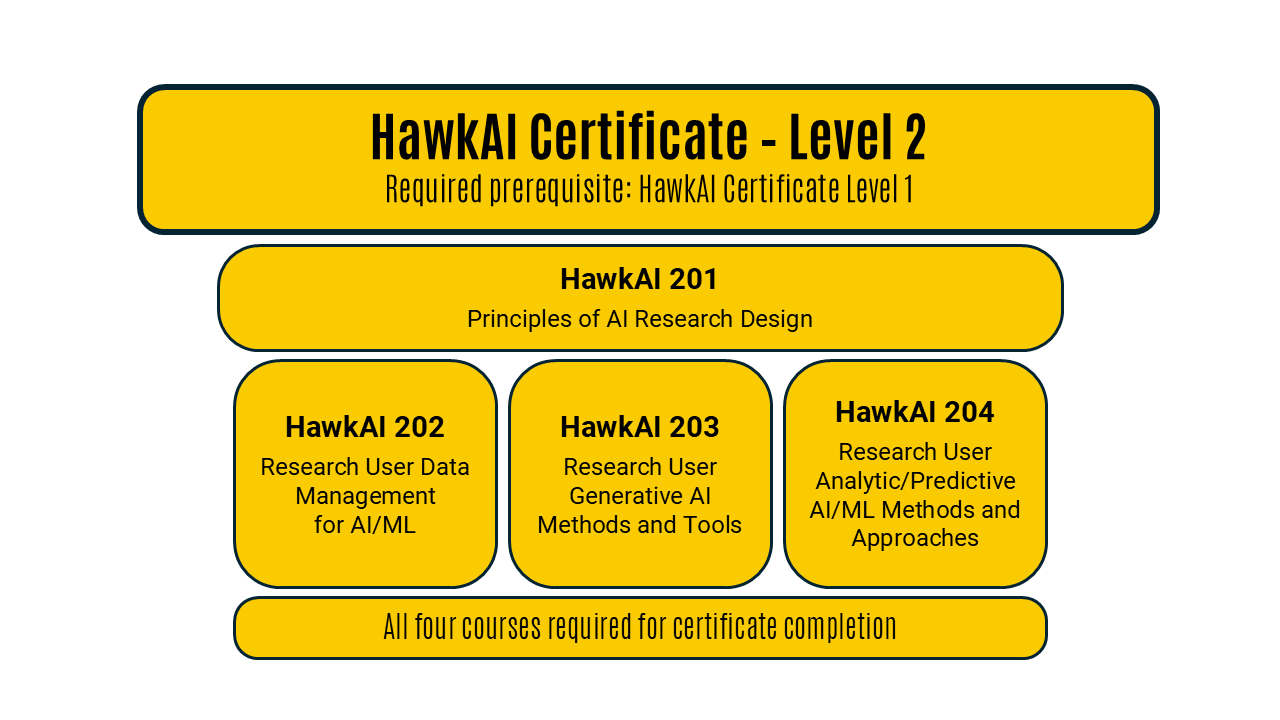
Level-2 HawkAI Courses and Enrollment Requirements
- The HawkAI short courses listed here can be taken individually based on specific interest of the enrolled participants, or they can be taken as a series to obtain a HawkAI Level-2 Certificate of Proficiency in Artificial Intelligence.
- To obtain Level-2 certificate, obtaining Level-1 certificate is a pre-requisite All level-2 courses HawkAI-201, HawkAI-202, HawkAI-203, and HawkAI-204 are required.
- While obtaining Level-1 certificate is a pre-requisite for Level-2 Certificate, any Level-2 short course can be taken individually as desired.
- Note however, that Level-1 experience will be expected to gain full benefits from Level-2 courses.
- The individual Level-2 short courses will be 2 hours in duration.
Level-2 Short Course Structure
- See course diagram above
Calendar of Level-2 Short Course Offerings
Level-2 HawkAI course calendar - Feb 2026
- PAST OFFERINGS:
- Level-2 HawkAI course calendar - Feb--Apr, 2025 - (CLOSED)
HawkAI Courses ... Who Developed, Who Teaches
Enroll Now - Spring 2026
Enroll HawkAI-201 Enroll HawkAI-202 Enroll HawkAI-203 Enroll HawkAI-204
Content Outlines of Level-I HawkAI Short Courses
- HawkAI 201: Principles of AI Research Design
- This short course will explore the opportunities and hazards of designing a research project incorporating AI or machine learning.
- In this course, we will consider
- New data collection, acquiring existing data, and data augmentation strategies
- Pro/Cons of the FAIR principles -- findable, accessible, interoperable, and reusable
- Sizing and funding the computational infrastructure
- Identifying AI technical support
- Identifying domain-specific (i.e. the data domain) expert guidance
- No computational background is required. Familiarity with HawkAI-101 and HawkAI-107 material is expected.
- HawkAI 202: Research User Data Management
- This short course will explore the ways to search for, collect, prepare, curate, and store data necessary for data-driven quantitative research
- In this course, we will consider
- Working with data from a variety of sources, including public databases, local-lab collected data, data from UIHC, as well as synthetically generated data
- Locations available for storage and computational access of such data will be discussed and their differences explained
- No computational background is required. Familiarity with HawkAI-201 material is expected.
- HawkAI 203: Research User Generative AI Methods and Tools
- This course will explore the use of Generate AI Methods and Tools as they relate to formulating, exploring, and addressing various research questions.
- In this course will we demonstrate:
- How large language models (LLMs) can be used at scale to summarize or gather insight from large amounts of textual data.
- How LLMs can be used to provided structure to or extract metrics from otherwise unstructured data.
- Capabilities and considerations of remote, closed-source models vs. local, open-source models.
- A variety of examples will be provided that demonstrate the potential of Generative AI as it relates to your research data and questions.
- No computational background is required. Familiarity with HawkAI 102 and 103 is expected.
- HawkAI-204: Research User Analytic/Predictive AI/ML Methods and Approaches
- This short course builds on the material presented in HawkAI-105 that introduced capabilities of Artificial Intelligence and Machine Learning (AI/ML), including deep learning.
- In this course, you will continue learning what Analytical AI can do for you and your data classification, forecasting, and labeling needs.
- Using in-depth case studies, the course will offer a detailed insight in the research-study design choices of the analytical AI models, their fine-tuning, performance evaluation, and possible use of achieved results for writing AI/ML flavored research grants.
- No computational background required. Familiarity with HawkAI-105 material expected.